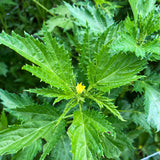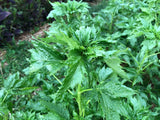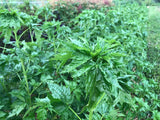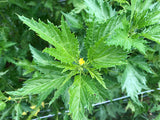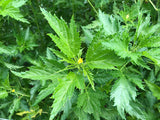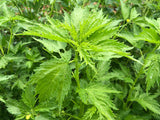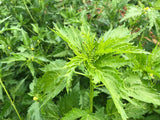Ewedu (Nigerian Jute Leaves)
Corchorus olitorius
Yoruba variety of shiny, green, palmate-shaped jute leaves used to make Ewedu Soup. Our friend Halima Salazar introduced us to this Nigerian specialty, and shared this preparation for these highly-nutritious, delicious, very slimy greens:
Ewedu Soup:
Pluck the leaves off the branch when fully mature and set aside. In a pot, put very little water and bring to a boil. Steam the ewedu leaves in the pot, and then pour into a blender. When it has been blended smooth, pour it back into the pot and add salt to taste. Serve with a West African Red Stew and Fufu or Pounded Yam.
Another delicious recipe includes:
Ewedu, water, fermented locust bean, crayfish, and bouillon.
Additional search terms: Mulukhiyah, mloukhiya, molokhia, molokhiya, mulukhiyya, malukhiyah, moroheiya, saluyot, lalo.
Days to maturity: 70
Seeds per pack: 140
Germination rate: 31% (total viability: 95%) on 01/06/2025 (read more about viability)
Planting / harvesting notes
Sow seeds indoors 6 weeks before the last frost. Plant outdoors in warm, fertile, well-drained soil 2-3 weeks after the last frost. This plant grows quickly and loves heat and will get much larger if irrigated, though it is not necessary. In cooler climates, molokhia grows faster and larger with the protection of high tunnels or greenhouses.
Seed keeping notes
Allow the seed pods to dry out naturally on the plant. Harvest the dried pods and remove the seeds. Allow the seeds to dry on paper away from direct sunlight. Store in paper envelopes, within a container, in a cool, dry location.








